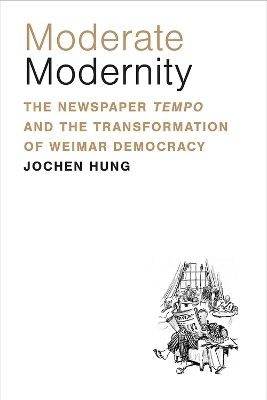
Moderate Modernity
The University of Michigan Press (Verlag)
978-0-472-13332-1 (ISBN)
- Titel z.Zt. nicht lieferbar
- Versandkostenfrei innerhalb Deutschlands
- Auch auf Rechnung
- Verfügbarkeit in der Filiale vor Ort prüfen
- Artikel merken
Focusing on the fate of a Berlin-based newspaper during the 1920s and 1930s, Moderate Modernity: The Newspaper Tempo and the Transformation of Weimar Democracy chronicles the transformation of a vibrant and liberal society into an oppressive and authoritarian dictatorship. Tempo proclaimed itself as “Germany’s most modern newspaper” and attempted to capture the spirit of Weimar Berlin, giving a voice to a forward-looking generation that had grown up under the Weimar Republic’s new democratic order. The newspaper celebrated modern technology, spectator sports, and American consumer products, constructing an optimistic vision of Germany’s future as a liberal consumer society anchored in Western values.
The newspaper’s idea of a modern, democratic Germany was undermined by the political and economic crises that hit Germany at the beginning of the 1930s. The way the newspaper described German democracy changed under these pressures. Flappers, American fridges, and modern music—the things that Tempo had once marshalled as representatives of a German future—were now rejected by the newspaper as emblems of a bygone age. The changes in Tempo’s vision of Germany’s future show that descriptions of Weimar politics as a standoff between upright democrats and rabid extremists do not do justice to the historical complexity of the period. Rather, we need to accept the Nazis as a lethal product of a German democracy itself. The history of Tempo teaches us how liberal democracies can create and nurture their own worst enemies.
Jochen Hung is Assistant Professor of Cultural History at Utrecht University.
Introduction. “Germany’s Most Modern Newspaper”
Tempo, Ullstein, and the late Weimar Republic
Chapter 1. 1928-29: Banging the Drum for Democracy
“Every Day a Race Against Time!” Technology, Speed, and Sachlichkeit in Tempo
Forming Rational Citizens: Tempo’s Definition of Democracy
Young Germans as Consumer-Citizens: Representations of Modern Masculinity and Femininity
Chapter 2. 1930-31: Adapting to the Crisis
Consuming against the Crisis: Tempo’s Vision of a German Consumer Society After 1930
Technology vs. the Soul: Tempo’s Discourse of Technology and Speed After 1930
Citizen-Consumers During a Time of Crisis: Tempo’s Construction of Modern Masculinity and Femininity After 1930
Chapter 3. 1932-33: “Freedom or Dictatorship”
“We vow to be happy!” Consumption as Duty in 1932
The Political Appeal of Slowness: Technology and Speed During the Crisis
The Oldest Guard Leads the Way: Constructions of Modern Maculinity and Femininity in 1932
30 January 1933: Ullstein under Hitler
“Everybody will have their own car!” Dreams of a “Volkswagen” in Tempo
Youthful Pessimism: Young Men and Women under Chancellor Hitler
The end of Tempo
Conclusion: Creative Adaptations of Modernity in the Interwar Period
| Erscheinungsdatum | 06.03.2023 |
|---|---|
| Reihe/Serie | Social History, Popular Culture, and Politics in Germany |
| Zusatzinfo | 29 illustrations |
| Verlagsort | Ann Arbor |
| Sprache | englisch |
| Maße | 152 x 229 mm |
| Themenwelt | Geisteswissenschaften ► Geschichte ► Regional- / Ländergeschichte |
| Sozialwissenschaften ► Kommunikation / Medien ► Journalistik | |
| Sozialwissenschaften ► Politik / Verwaltung ► Politische Systeme | |
| Sozialwissenschaften ► Politik / Verwaltung ► Politische Theorie | |
| ISBN-10 | 0-472-13332-2 / 0472133322 |
| ISBN-13 | 978-0-472-13332-1 / 9780472133321 |
| Zustand | Neuware |
| Haben Sie eine Frage zum Produkt? |
aus dem Bereich


